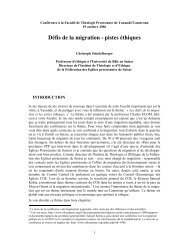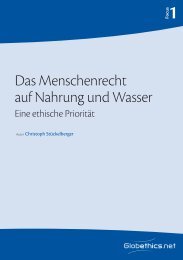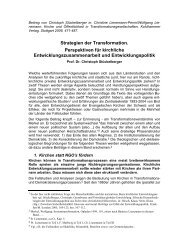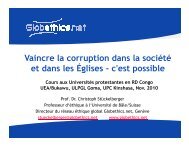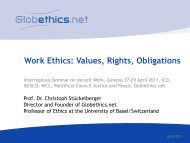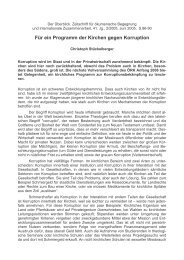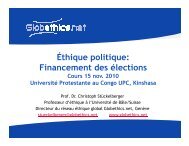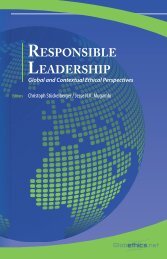BREAK THE CHAINS OF OPPRESION AND THE YOKE OF ...
BREAK THE CHAINS OF OPPRESION AND THE YOKE OF ...
BREAK THE CHAINS OF OPPRESION AND THE YOKE OF ...
Create successful ePaper yourself
Turn your PDF publications into a flip-book with our unique Google optimized e-Paper software.
DiaLo g<br />
side of the poor and those deprived of their rights in order to be committed together<br />
to a better justice. And because we believe that the earth was made by<br />
God and was entrusted to humanity we are united in striving for the conservation<br />
of creation on the basis of an ecological justice.<br />
It seems to me noteworthy that we decided at a crucial point to begin with the<br />
question of Human Rights. Commencing with the theological foundation outlined<br />
we understand human dignity as a inalienable gift of God to every person,<br />
regardless of sex, ethnic origin, skin colour, ability, religious affiliation or political<br />
conviction. And from this God-given human dignity is then derived the validity<br />
of human rights for every person. To human rights belong the General<br />
Declaration of Human Rights of 1948, the International Agreement on civil and<br />
political rights of 1966 and the International Agreement on economic, social<br />
and cultural rights of the same year. The decision to begin with Human Rights is<br />
important because it can surmount conscious or unintentional paternalism in<br />
the relationships between rich and poor. The approach shows that the poor are<br />
not the recipients of the compassionate contributions of the wealthy for which<br />
the poor should be thankful; the poor have a right to political and economic justice<br />
and a right to a decent life in which e.g. the right to sufficient healthy nourishment,<br />
adequate accommodation, education and political participation becomes<br />
a reality.<br />
On this basis the ethical consequences of significant aspects of economic globalisation<br />
are then developed. The concrete demands on politics and finance can be<br />
sketched in outline as follows:<br />
● The achievement and protection of the human rights of the poorest is the<br />
criterion on which we judge politics and finance.<br />
● Conservation �with �a just and � sustained development � � must take precedence<br />
over the interests of profit.<br />
● The primacy of politics over the globally-trading financial and economic<br />
concerns must be recovered.<br />
● Human dignity and justice demand the democratic participation of all in<br />
the processes of decision which affect them.<br />
● The financial and trade-markets do not need liberalization and deregulation<br />
but legal rules which promote a humane and ecologically just development.<br />
As might be expected the debate on “Empire” proved extremely difficult. For the<br />
representatives of the Uniting Reformed Church in Southern Africa there could<br />
be no joint document without reference to what was called “Empire” in the<br />
“Confession of Accra”. Some representatives of the Reformed Church in Germany<br />
would have preferred to relinquish the concept of “Empire” completely. It<br />
became very clear to me: In the conflict over the concept of “Empire” different<br />
experiences of globalisation clash. If I understood it correctly one can say: People<br />
in the countries of the South experience themselves first and foremost as the victims<br />
of neo-liberal economic globalisation. They experience exploitation and<br />
��������������������������������������������<br />
� � �������������������<br />
�<br />
– The Joint Globalisation – Dialog on Basic Issues – 115



